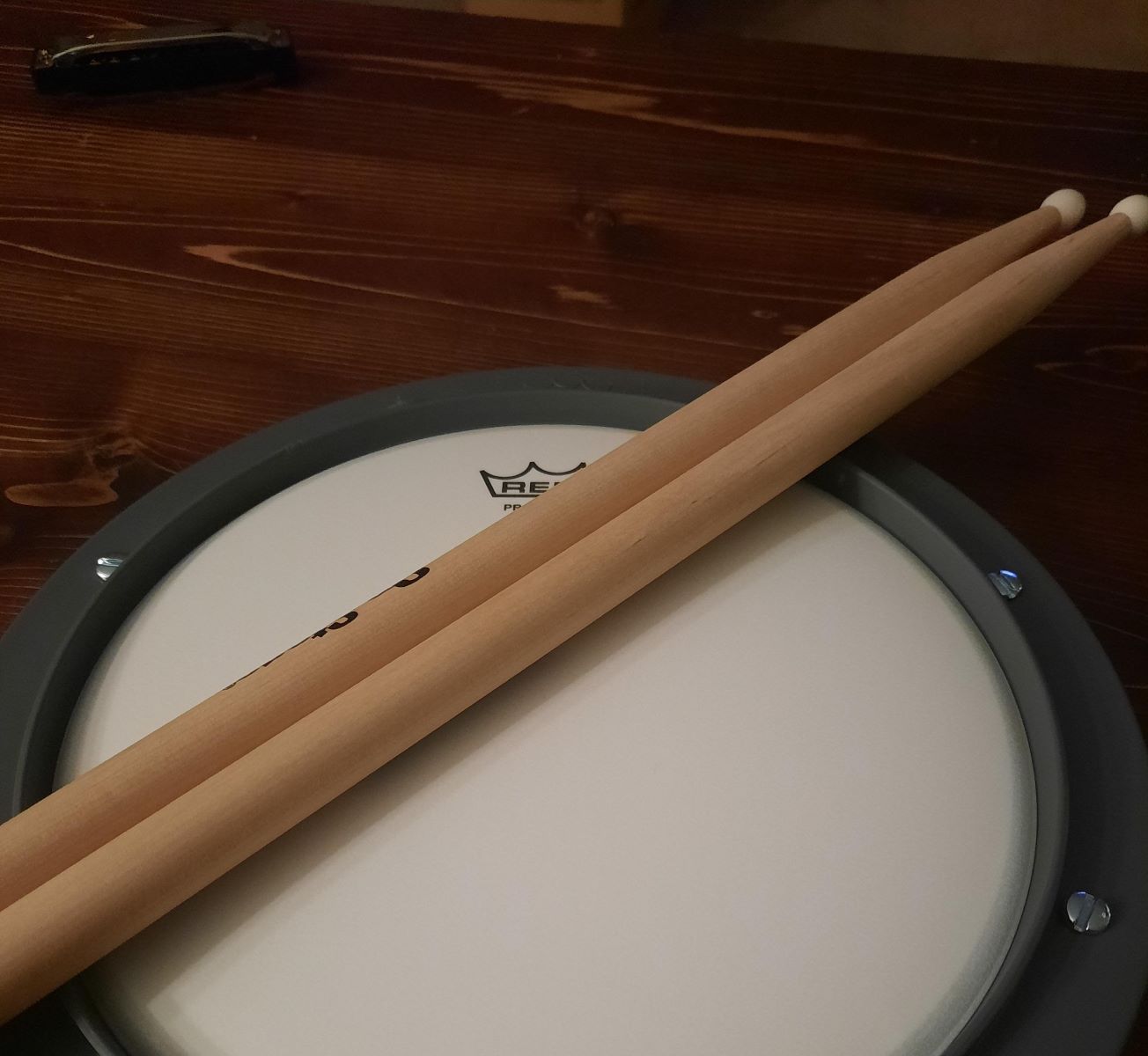Home>Instruments>Drums>How Long Does It Take To Learn Drums


Drums
How Long Does It Take To Learn Drums
Published: February 7, 2024
Discover how long it takes to master drums and accelerate your learning with expert tips and strategies. Start your drumming journey today!
(Many of the links in this article redirect to a specific reviewed product. Your purchase of these products through affiliate links helps to generate commission for AudioLover.com, at no extra cost. Learn more)
Table of Contents
Introduction
Learning to play the drums is an exciting journey that offers a gateway to rhythm, musical expression, and creativity. Aspiring drummers often wonder: how long does it take to learn drums? The answer to this question is multifaceted and depends on various factors. In this article, we will explore the key elements that influence the time it takes to become proficient in drumming, including practice, dedication, and the availability of learning resources.
Embarking on the path to mastering the drums requires commitment, patience, and a deep appreciation for rhythm. While some may progress rapidly, others may require more time to hone their skills. Understanding the variables that impact the learning process can provide valuable insights for aspiring drummers, helping them set realistic expectations and navigate their musical journey with confidence.
Whether you're a beginner with a burning passion for percussion or an enthusiast seeking to enhance your drumming prowess, this article will shed light on the diverse aspects of learning drums and offer guidance to support your musical endeavors. Let's delve into the fascinating world of drumming and uncover the essential factors that shape the learning timeline.
Factors Affecting Learning Time
The duration required to learn drums is influenced by a multitude of factors that can vary from person to person. Understanding these factors can provide valuable insights into the learning process and help aspiring drummers set realistic expectations. Some of the key elements that affect the learning time for drums include:
- Previous Musical Experience: Individuals with prior musical experience, especially in rhythm-centric instruments such as percussion or piano, may find it easier to grasp drumming concepts, potentially shortening the learning curve.
- Natural Rhythm and Coordination: A person’s innate sense of rhythm and coordination can significantly impact their progress in learning drums. Those with a natural inclination towards rhythm may find it easier to adapt to drumming techniques.
- Age and Cognitive Development: The age at which an individual begins learning drums can influence the learning process. Younger learners often have greater neuroplasticity, allowing them to absorb new skills more readily, while older learners may bring cognitive maturity and discipline to their practice.
- Learning Style and Aptitude: Everyone has a unique learning style and aptitude for musical pursuits. Some individuals may excel in auditory learning, while others may benefit from visual or kinesthetic approaches. Understanding one’s learning style can optimize the learning process.
- Time Invested in Practice: The amount of time dedicated to practice plays a pivotal role in skill development. Consistent and focused practice sessions can expedite the learning process and enhance proficiency.
- Quality of Instruction: Access to skilled instructors and comprehensive learning materials can significantly impact the learning trajectory. Effective guidance and mentorship can streamline the learning process and prevent the development of detrimental habits.
- Physical Fitness and Endurance: Drumming requires physical stamina and endurance. Individuals with higher levels of physical fitness may adapt more quickly to the physical demands of drumming, potentially shortening the learning timeline.
By recognizing these influential factors, aspiring drummers can gain a deeper understanding of the nuanced elements that shape their learning journey. While these factors contribute to the learning timeline, it’s essential to approach the process with patience, determination, and a growth mindset, acknowledging that progress is a unique and personal experience for each individual.
Practice and Dedication
When it comes to learning drums, the adage “practice makes perfect” holds true. The amount and quality of practice, coupled with unwavering dedication, are pivotal in determining the proficiency and pace of skill development. Here are key insights into the significance of practice and dedication in the journey of learning drums:
Consistent and focused practice sessions form the bedrock of skill acquisition in drumming. Regular practice not only hones technical abilities but also cultivates a deep understanding of rhythm, timing, and musical expression. Aspiring drummers are encouraged to establish a structured practice routine, allocating dedicated time for skill refinement and repertoire expansion.
Moreover, the quality of practice is equally crucial. Deliberate and mindful practice, characterized by focused attention on technique, dynamics, and musicality, fosters accelerated progress. It is essential for drummers to engage in purposeful practice, identifying areas for improvement and working systematically to refine their skills.
Dedication to the craft of drumming is a driving force behind skill development. The willingness to invest time, effort, and perseverance, especially during challenging phases, is instrumental in overcoming obstacles and achieving milestones. Drummers who approach their practice with unwavering dedication are more likely to experience steady growth and mastery of their instrument.
Furthermore, embracing a growth mindset is integral to sustained progress. Viewing challenges as opportunities for learning and maintaining a positive attitude towards skill development can bolster motivation and resilience. As drummers encounter complex rhythms, techniques, and musical styles, a dedicated mindset empowers them to navigate the learning curve with determination and enthusiasm.
In essence, the combination of consistent, high-quality practice and unwavering dedication forms the cornerstone of successful drumming endeavors. By immersing oneself in deliberate practice, nurturing a resilient dedication to the craft, and fostering a growth-oriented mindset, aspiring drummers can chart a rewarding path towards mastering the art of drumming.
Learning Resources
Access to diverse and effective learning resources can significantly influence the learning trajectory of aspiring drummers, providing them with valuable guidance, inspiration, and knowledge. Here are essential learning resources that can enrich the journey of mastering the drums:
- Instructors and Mentors: Skilled drum instructors and mentors offer personalized guidance, technical insights, and constructive feedback, nurturing the development of aspiring drummers. Their expertise and mentorship play a pivotal role in honing technique, musicality, and overall proficiency.
- Online Drum Lessons: The digital landscape offers a wealth of online drum lessons, courses, and tutorials, catering to diverse skill levels and musical genres. These resources provide flexibility and accessibility, allowing drummers to learn at their own pace and explore a wide array of instructional content.
- Drumming Books and Publications: Written resources, including instructional books, sheet music, and drumming publications, serve as valuable references for technique, musical theory, and stylistic exploration. They offer in-depth knowledge and insights that complement practical learning.
- Video Demonstrations and Performances: Watching live performances, drum covers, and instructional videos can inspire and educate aspiring drummers, offering visual demonstrations of techniques, grooves, and musical concepts. Video resources provide a dynamic and immersive learning experience.
- Drumming Communities and Forums: Engaging with drumming communities, online forums, and social media groups facilitates knowledge sharing, networking, and mentorship opportunities. Connecting with fellow drummers fosters a sense of camaraderie and provides a platform for collaborative learning.
- Practice Tools and Apps: Utilizing metronomes, drum machine apps, and practice tools enhances rhythmic precision, timing, and groove development. These technological resources complement traditional practice methods and offer valuable support for skill refinement.
By leveraging these diverse learning resources, aspiring drummers can cultivate a comprehensive and multifaceted approach to skill development. The amalgamation of expert guidance, digital learning platforms, written materials, visual resources, community engagement, and technological tools empowers drummers to navigate their learning journey with depth and enrichment.
Conclusion
Embarking on the journey to learn drums is a rewarding and multifaceted endeavor, shaped by a confluence of factors that influence the learning timeline. Aspiring drummers are encouraged to approach their musical pursuit with a blend of patience, dedication, and a growth-oriented mindset, recognizing the diverse elements that contribute to skill development.
Understanding the influential factors, such as previous musical experience, natural aptitude, practice dedication, and the availability of learning resources, provides valuable insights for aspiring drummers. While the learning timeline may vary for each individual, the commitment to consistent and purposeful practice, coupled with unwavering dedication, forms the bedrock of skill acquisition in drumming.
Furthermore, the accessibility of diverse learning resources, including skilled instructors, online lessons, written materials, video demonstrations, community engagement, and technological tools, empowers drummers to cultivate a comprehensive approach to skill development, fostering enrichment and depth in their musical journey.
Ultimately, the journey of learning drums is a dynamic and transformative experience, characterized by growth, resilience, and the joy of musical expression. Aspiring drummers are encouraged to embrace the process with passion and perseverance, savoring each milestone and embracing the continuous evolution of their musical prowess.
Whether embarking on the rhythmic odyssey as a novice enthusiast or seeking to elevate existing drumming skills, the pursuit of drumming proficiency is a testament to the enduring allure of rhythm and the boundless potential for creative expression. With dedication, guidance, and a steadfast commitment to growth, aspiring drummers can chart a fulfilling and resonant path towards mastering the art of drumming.











